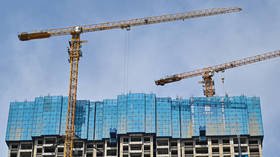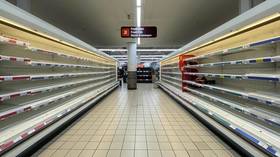China’s GDP growth slumps as real estate and energy crises take toll

The Chinese economy grew by 4.9% from July to September compared to the previous year – its weakest pace since the third quarter of 2020, data published by the National Bureau of Statistics (NBS) on Monday shows.
It represents a significant slowdown from the 7.9% reported in the second quarter of the current year, and a further decline from the 18.3% expansion registered in January to March.
The modest growth misses the median forecast of 5% in a Reuters survey of economists. Industrial production grew 3.1% in September, below the 4.5% projected by Reuters’ survey. Retail sales were reportedly up 4.4% in September from a year ago.
Also on rt.com Is China trying to reset its entire housing market in response to the Evergrande crisis? Boom Bust investigates“Since entering the third quarter, domestic and overseas risks and challenges have increased,” Fu Linghui, a spokesperson for the bureau, told journalists, stressing that the nation’s economic recovery was still unstable and uneven.
One of the major factors weighing on the Chinese economy is the country’s real-estate crisis triggered by Beijing’s tighter restrictions on the property market in response to the worsening debt crisis of major developers like the Evergrande Group.
Also on rt.com China’s trade surplus with US surges to record $42bn in SeptemberMoreover, the global energy crisis reportedly had a dramatic impact on China’s industrial sector, while consumer spending was dragged down by strict measures to tackle sporadic coronavirus outbreaks.
On Sunday, People’s Bank of China Governor Yi Gang said the recovery remained intact, even though growth momentum has “moderated somewhat.” He expects the economy to expand by 8% in 2021, higher than Beijing’s modest target of above 6%.
For more stories on economy & finance visit RT's business section














